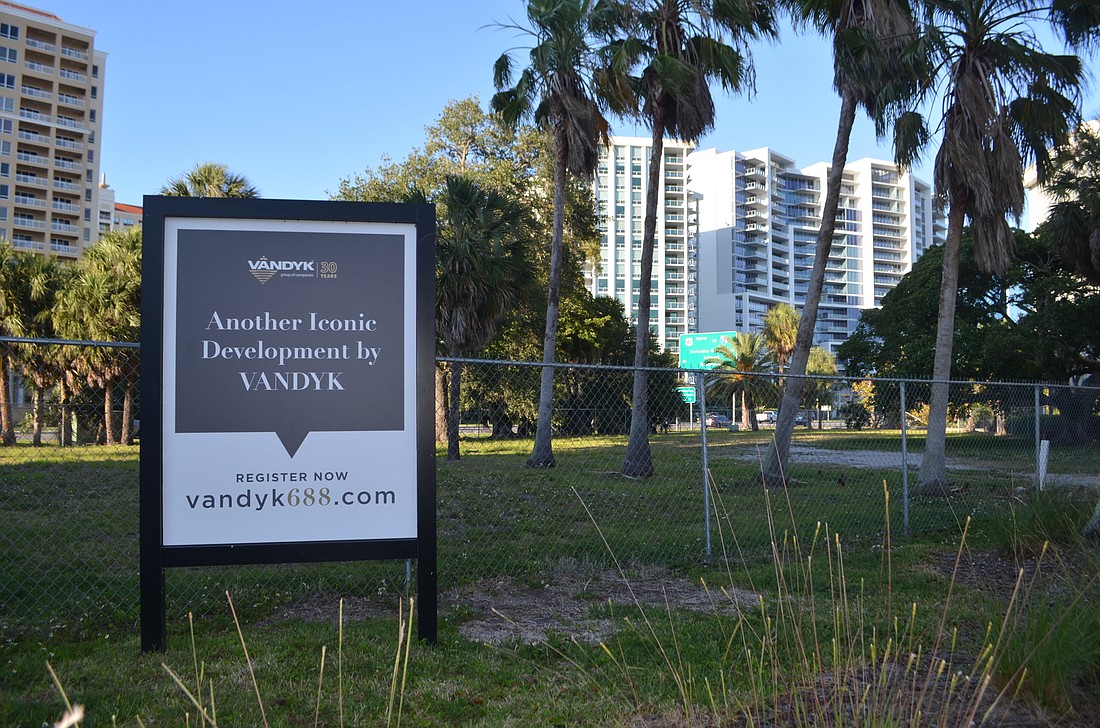- April 24, 2024
-
-
Loading

Loading

With three more residential projects in development in Golden Gate Point, people living in the area want the city to consider adjusting the parking regulations in the waterfront neighborhood.
It was a point of concern in September, when a builder held a meeting to discuss plans for Evolution, a 20-unit condominium at 111 Golden Gate Point. And it’s a point of concern now, as developer Vandyk asks the city to approve some design adjustments for its 15-unit project at 688 Golden Gate Point.
Vandyk is discussing its plans with residents before the city’s Board of Adjustments considers the request, which seeks reduced setbacks and increased building coverage, among other variations from standard building regulations.
As the conversation continues with the developer about those design elements, Golden Gate Point Association Joan Lovell wants to make sure officials are aware the neighborhood remains focused on parking, too.
“There are limited public parking spaces on Golden Gate Point, and when built out under current zoning, everyday living will become challenging,” Lovell said in an email.
In the past five years, vacant space on the 22-acre peninsula has dwindled and prospective builders have turned their attention to redeveloping parcels with older buildings in the neighborhood.
In turn, that’s sparked an ongoing conversation about the area’s parking needs. Lovell said neighbors are worried because on-street parking is a finite resource, and the city’s zoning code doesn’t address the need for additional on-site parking for guests or laborers.
City regulations call for a minimum of two parking spaces per residential dwelling unit. Although there are building standards that specifically apply to Golden Gate Point, those rules do not pertain to the number of parking spaces required for a new project. The Evolution project includes 42 parking spaces for 20 units. Residents at the September meeting said they feared that isn’t enough.
At the time, those in attendance discussed the best strategy for trying to grow the parking supply in the neighborhood. Brent Parker, an architect and Golden Gate Point resident, suggested the city would pay attention if those living in the area banded together to make their concerns apparent.
“If the whole neighborhood is standing there and there’s 30 of us yelling and screaming, ‘We want this,’ then they tend to cave in,” Parker said at the September workshop.
City planning staff is reviewing existing parking regulations as part of a larger analysis of potential changes to the zoning code. Although staff did not speak specifically to the conditions in Golden Gate Point, officials have heard resident concerns about parking constraints associated with increased development, particularly near downtown.
Parking Manager Mark Lyons said the city is taking that into consideration. But among parking and planning professionals, he said there are also arguments in favor of more relaxed requirements for new projects.
Mandating a certain number of parking spaces increases a developer’s expenses while reducing the number of units they can build, which means each residence will cost more.
As the city strives to increase the supply of affordable housing, reducing parking minimums could be one policy officials consider.
Lyons brought up another potential benefit of not requiring a high supply of on-site parking: reducing the number of cars on the street.
If planners don’t prioritize the convenience of drivers, people might opt for alternative modes of transportation when getting around downtown. Over time, that could reduce congestion and pollution, Lyons said.
He acknowledged Golden Gate Point had some unique conditions when compared to other residential areas downtown. As developers plot luxury projects in the area, relaxed parking requirements probably won’t lead to affordable housing in the area.
Even on a project-by-project basis, Lyons said staff hears from some developers who want to build fewer parking spaces than what’s required and others who want to incorporate even more.
Although final recommendations are still forthcoming — and the City Commission will have the ultimate authority to approve any changes — Lyons said the city won’t take a one-size-fits-all approach for managing parking regulations.
“How do we consider each area under its own particular goals and needs?” Lyons said.